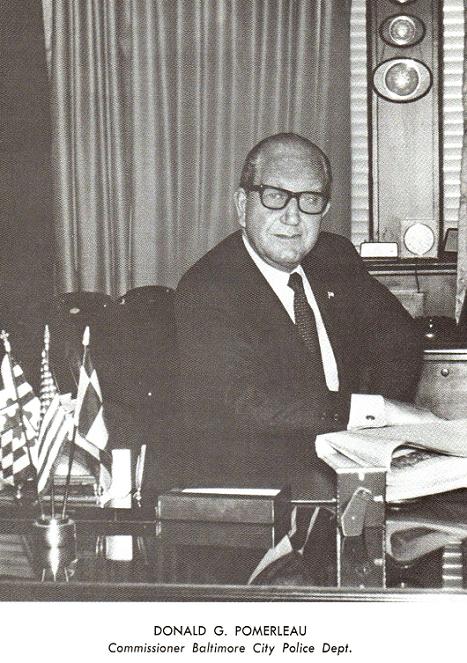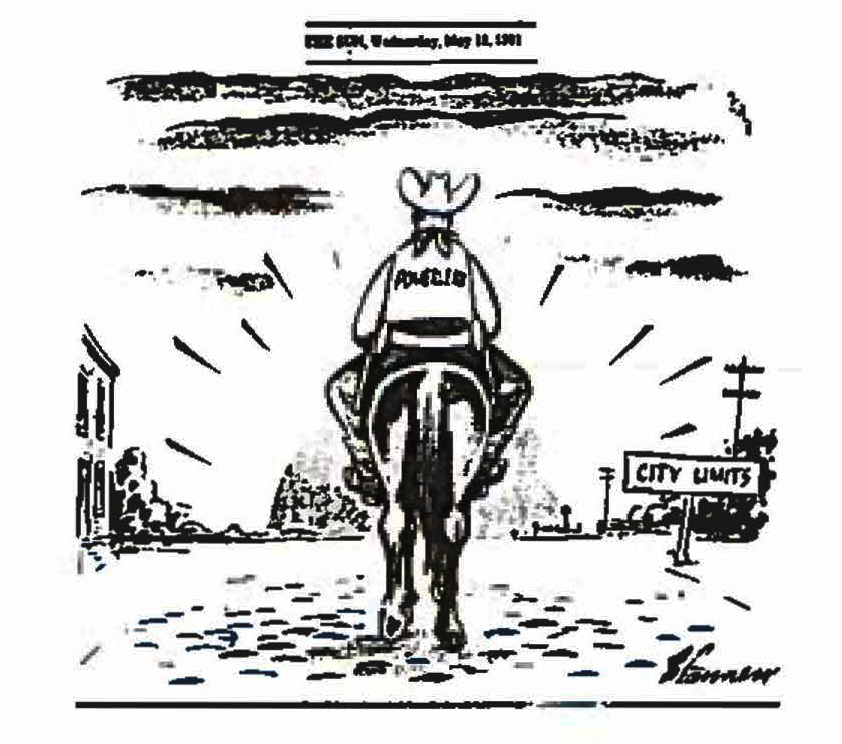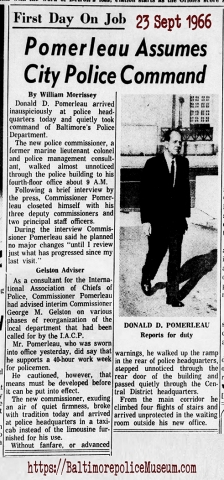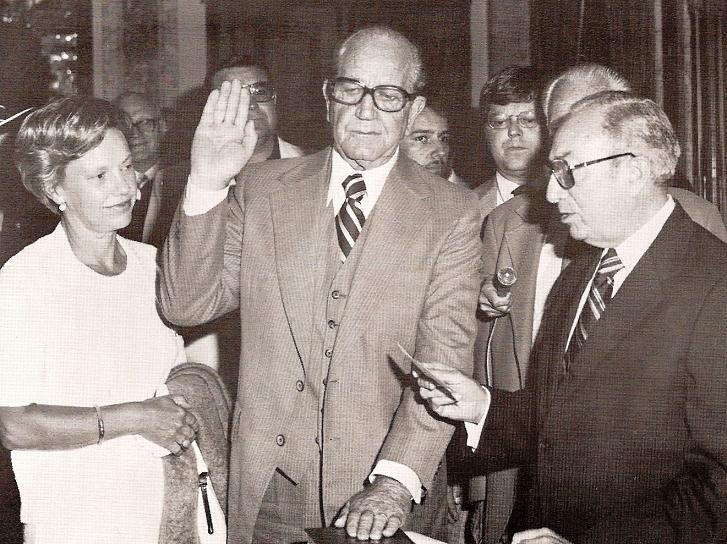Donald D. Pomerleau
Donald D. Pomerleau (August 31, 1915 – January 19, 1992) was the City Police Commissioner of Baltimore, Maryland from 1966 to 1981.

Donald Pomerleau
From Wikipedia, the free encyclopedia
Donald D. Pomerleau (August 31, 1915 – January 19, 1992) was the City Police Commissioner of Baltimore, Maryland from 1966 to 1981.
Background
Pomerleau was born on a ranch near Medicine Lake, Montana, with an unusual western, rural upbringing for a future big-city police supervisor.
After graduating from high school in Whitehall, Montana in 1933, Pomerleau joined the Marines and served in China from 1934 to 1937. He was discharged honorably from the Marines as a sergeant in 1938. After his discharge, Pomerleau worked for a construction company in Nevada, and then for the U. S. Border Patrol in California and Arizona. In 1942, after World War II began, he re-enlisted and served in the Military Police Corps of the United States Army. Pomerleau served in the Guadalcanal Campaign, the Battle of Tarawa, the Battle of Saipan, and Battle of Tinian. Pomerleau was discharged in 1945.
During the Korean War, Pomerleau served as a combat commander. He served as provost marshal at the Marine Corps School and University, retiring in 1958 with the rank of lieutenant colonel.
Pomerleau became the Director of Public Safety in Kingsport, Tennessee. He assumed a similar position later in 1962 in the City of Miami-Dade County. But he was not well-respected or liked by the Miami-Dade County police force, and generally could not get his way or institute his programs and policies.
By 1964, he became a consultant for the Baltimore City Police Department sent by the International Association of Chiefs of Police (IACP). The IACP then also sent Pomerleau in 1965 to investigate Baltimore during the heat of the earlier years of the civil rights movement, with rising fears of civil unrest in the wake of the Watts Riots in Los Angeles that year. Pomerleau declared that "the Baltimore City Police Department was amongst the nation's most antiquated and corrupt police forces which had practiced excessive force and had a non-existent relationship with Baltimore's large Negro (then Black, later African American) community". To improve the Department and try to prevent future racial rioting, Maryland's 54th Governor, J. Millard Tawes, (1894-1979), [served 1959-1967], an Eastern Shore Democrat, whose Office had for a century, since before the American Civil War, held the power to appoint Baltimore City's Commissioner of Police. In consultation with Baltimore's then progressive Republican Mayor (and former 1950s Governor himself), Theodore R. McKeldin, (1900-1974), [38th and 42nd Mayor, served 1943-1947, 1963-1967], he hired Pomerleau the following year of 1966 with a mandate and charge to "clean up" the Department. Although it seemed that the new Commissioner came with a relatively liberal attitude toward race relations, urban poverty, and crime and many observers feel that he gradually turned more conservative and even autocratic as his tenure wore on, so that by the time of the Republican presidency of Richard M. Nixon in the 1970s, Pomerleau's attitudes and policies had come to resemble those of Nixon's "silent majority" rather than those that Governor Tawes and Mayor McKeldin expected.
The new police commissioner moved to the City and lived at 4009 Keswick Road (off University Parkway) in the southern lower neighborhood of Roland Park in North Baltimore.
Impact on the police force
Soon after his appointment, Pomerleau made it easier for people to join the force, decreasing vacancies from 418 to 370 within six months. His first budget proposal included higher salaries and bigger pensions for patrolmen/officers, new vehicles (with a re-designed "friendlier" blue and white paint scheme, to replace the long-time traditional "black and whites"), setting up of an analysis center, additional money for recruitment, and a school for continuous training of officers, following up on the police academy. He quickly equipped police with mace, helmets, walkie-talkies, and more vehicles with radio-contact communications and body radios for officers, phasing out the old green "call boxes" on a post, dotting city streets, after securing a $48 million budget from the City — an increase of $15 million over a three-year span.
Operations
Pomerleau was a believer in a military hierarchy and created a strict chain of command. He also introduced new riot control tactics: for example, distinguishing 'offensive' weapons ('chemical agents such as tear gas') from defensive weapons (nightstick, revolver).
African Americans
Pomerleau immediately recognized racial tension as a major challenge for the BCPD. Soon after his appointment, he asked officers to take crash courses in Black (now African-American) history.
Pomerleau also lifted remaining job restrictions on African American officers from when the Department first tentatively recruited a limited number of "Colored" patrolmen in the 1930s, who were previously limited to foot patrols, quarantined in rank, barred from patrolling in "White" neighborhoods, and given limited specialty assignments. However, the percentage number of blacks on the force, and particularly the number of black promotions, remained low, during Pomerleau's tenure and only began to rise dramatically by the 1980s.
Spying
Inspectional Services Division
Immediately after his appointment, Pomerleau created the "Inspectional Services Division" (ISD), an agency responsible for "active surveillance of individuals or groups outside the normal criminal behavior". Over the next 10 years, the ISD spied on nation-wide plus local affiliates of organizations like the American Civil Liberties Union, the American Friends Service Committee, and the Black Panther Party.
Outside reports
Year after year from 1971 to 1978, Representative Parren Mitchell (from the 7th Congressional District) called for Pomerleau's resignation because of alleged spying (and even possible harassment) on black-oriented organizations and associations especially those involved in the growing anti-Vietnam War movement of the late 1960s and early 1970s.
He was also accused of spying on and harassing members of Police Local 1195 for the purpose of union-busting.
In 1976, The Maryland Senate issued a report stating that Pomerleau had used illegal spying methods, including wiretapping, surveillance, and illicit acquisition of credit reports. Pomerleau said he had done nothing illegal and that any spying was a necessary countermeasure against 'subversive elements' in the Department.
Journalists reported that Pomerleau had intimidated them using information from his spy network. Michael Olesker of the Baltimore Sun described meeting Pomerleau in the mid 1970s: "'Listen,' he said, 'I know where you've been, I know who you've talked to, and I know what you've been told.'" And he did."
Praise and criticism
Pomerleau received constant support and praise from Mayor Schaefer and Governor Mandel.
In 1976, Pomerleau was the Advertising Club of Baltimore's "Man of the Year".
Post-police commissioner career
Pomerleau was one of the longest-serving police commissioners of Baltimore holding that post for a period of 15 years, the longest tenure since Charles Gaither who held the first posting of the newly created Office of Commissioner of Police at the last major re-organization and structuring of the BCPD from 1920–1937.[
Baltimore's Best Security
Pomerleau retired from the Baltimore City Police Department in September 1981.
In October 1981, Commissioner Pomerleau was hired by the Abacus Corporation, a nation-wide private security and guard force agency which then received an expanded contract with the city and established "Abacus Security Services".
The following month of November, Pomerleau created a private firm called "Baltimore's Best Security". This firm was to create special quasi-private police force for maintaining security of public buildings. Members of this force would have more authority than those of ordinary private firms; however, they would not be subject to city personnel regulations. The creation of the company—and its immediate endorsement and announcement of a no-bid contract by Mayor Schaefer—provoked an outcry from Baltimoreans, who called it expensive and unaccountable and feared that it would be favored over some of the city's preexisting black-owned firms.
The City Council, in late 1981, led by President Walter Orlinsky, accused Pomerleau and Schaefer of attempting to establish a "shadow government". The Council attempted to pass rules that would restrict the role of quasi-private agencies in city governance. This was the beginning of a 30-year controversy involving the use of a massive "slush fund" treasury, issuance of city-backed bonds for various "civic improvement" and commercial/residential "urban renewal" by a newly created public-private agency, the Baltimore Development Corporation and its powerful Trustees, which continued the major re-development of the "Inner Harbor" area where previous city agencies from the 1950s to 1970s left off, and soon expanded its reach and influence among its projects throughout the City. The controversies endured through six more mayoral administrations up to 2013, upon the retirement of long-time BDC head, M. Jay Brodie. It even became a matter for local humor as one time at an event, Mayor William Donald Schaefer, showed up with a long black cape draped and curled around his body and arm, topped by a black slouch fedora hat of the 1940s detective-style novels and cartoons or the old prime-time radio drama "The Shadow" with character "Lamont Cranston". Newspaper photographs flew around the Nation! "Baltimore's Best Security" was not heard from again; however, Abacus continued to receive no-bid city contracts.
Pomerleau died of cancer at his new retirement home in Edwardsville, Virginia.
![]()
DONALD D. POMERLEAU
August 31, 1915 - January 19, 1992
Former Police Commissioner Donald D. Pomerleau died quietly last week after a long and valiant struggle with cancer. He fought his final battle with all the bravery, tenacity and legendary iron will that this former Marine could muster. He was 76 years of age.
This century has seen few, if any men who have had such a direct impact upon the Baltimore Police Department and the profession of law enforcement. Among the giants of police leadership in the United States, he stood as a titan. He was a private man ... aloof some would say ... and at times controversial. But there are none who would deny that he was the driving force that turned a problem ridden police force into one of the most efficient and well-respected law enforcement agencies in any major city.
"He was a man of vision, never afraid to say what was on his mind, regardless of the consequences. He set an example that many have tried to follow, but few have had the ability to live up to. He will be missed. "
William Donald Schaefer
Governor
State of Maryland
More than a decade after his retirement, the legacy of Donald Pomerleau is still reflected in the department. Much of the form and function of the department in 1992 is directly the result of the "cutting edge" management innovations he established more than 20 years ago. During his 15-year tenure as Police Commissioner, he most notably reorganized
the department, streamlined it, modernized it, equipped it and instilled within its ranks a sense of pride and professionalism. He perhaps more than any other person introduced to the citizens of Baltimore the concept of the "professional police officer."
"I appreciate the fact that he really set the stage for intergovernmental cooperation for
federal and local law enforcement even before it became popular, and we have benefited from his forward-looking policies. "
Kurt l. Schmoke
Mayor
City of Baltimore
The benefits that Donald Pomerleau brought to not only the Baltimore Police Department but to the citizens of Baltimore were enormous in their impact. In 1966, Commissioner Pomerleau accepted the challenge of totally restructuring a major metropolitan police agency. He first surrounded himself with a dedicated and highly qualified staff. He modernized communications. He computerized records management. He added helicopters to the patrol force. He updated and modernized the training academy. He gave greater emphasis to the police role in community relations. He established a modern crime laboratory. He recognized the importance of education and helped provide avenues for officers to pursue advanced degrees.
"It has been said that the real leader has no need to lead, he is content to point the way. Donald Pomerleau was a man of action and a visionary. He indeed pointed the way for myself and others toward a new era of law enforcement in this city and nation. I feel privileged to have personally known and served with him. His passing has left a void in the law enforcement community. The Lord seldom grants us men of his stature, and I was most fortunate to have worked very closely with such a great man."
Edward V. Woods
Police Commissioner
That Donald Pomerleau was at times controversial cannot be denied. But, according to the Baltimore Afro-American newspaper commentary in May 1984; "Commissioner Pomerleau was given the charge to make the Baltimore City Police Department a department that could rank in quality with any large city police force, anywhere in the country. Commissioner Pomerleau's job was not a job that would endear him to many people in Baltimore, inside the police department as well as people outside the department. By and large; everyone agrees that Pomerleau did his job well.
The Baltimore Sun in a September 1981 editorial observed that " no police commissioner in a turbulent American city can escape controversy. That controversy occasionally surrounded Pomerleau isn't the point. That he had a good police department without scandal for 15-years, a spectacularly long tenure for an urban chief, is significant. He was, as one longtime observer put it, 'a rock, and a rock is what Baltimore needs.'" Donald D. Pomerleau was born in Medicine Lake, Montana. His early years were spent in and around Medicine Lake's sprawling ranches and farmlands. At the age of 19 he entered the United States Marine Corps as a Private. He left the military to serve as a Patrol Inspector with the United. States Border Patrol, but returned to the Marine Corps in 1942. Twenty-two years later he retired as a Lieutenant Colonel with extensive combat experience during wartime and Military Police expertise during peacetime.
Upon his military retirement, he entered civilian law enforcement. His first position was Director of Public Safety in Kingsport, Tennessee, where he served until his appointment as the Director of Public Safety in Dade County, Florida in 1962. A thorough understanding of the law enforcement process on a national level was demonstrated in his next position as a staff consultant for the International Association of Chiefs of Police. In this capacity he participated in the reorganizational process of police departments around the nation, including Chicago; Dallas; Washington D.C.; Syracuse, New York; and finally, Baltimore. His effective work in Baltimore led to his selection as
Commissioner in 1966.
"Donald Pomerleau was the right man at the right time for the Baltimore Police Department. Personally, one could not be professionally associated with him without some of his knowledge, innovativeness and tenacity rubbing off on them. We who knew him, the Department itself, and law enforcement in general are all the better because of him.,
Joseph W . Nixon
Deputy Commissioner
A graduate of the first class of the FBI National Executive Institute, the 55th Session of the FBI National Academy, the Federal Bureau of Narcotics Training School, and the U.S. Border Patrol Academy, Donald Pomerleau was an advocate of the high standard of education and training exemplified by these institutions.
"Donald Pomerleau has had a lasting impact in the area of supporting higher education and training for law enforcement. He early on realized the importance to the professional police officer of the balance between education, theory and practical policing. He stands with the likes of 0. W. Wilson in this regard. "
Dr. Elizabeth Gray
Criminal Justice Chairperson
Coppin State College
During his distinguished tenure as Commissioner, he brought prominence to himself and the Department through his various associations and memberships. Among these were:
- President, Maryland Association of Chiefs of Police
- Chairman, Major Cities Chiefs Administrators
- Chairman, Maryland Police Training Commission Member, Governor's Commission Law Enforcement and the Administration of Justice
- Member, Mayor's Coordinating Council on Criminal Justice Member, Advisory Board of the National Conference of Christians and Jews Member, Law Enforcement Council of the National Council of Crime and Delinquency
- Member, President Ronald Regan's Transitional Team
- Member, President Jimmy Carter's National Strategy/Council on Narcotics Member, Major Cities Chiefs Association Advisory Member, Chamber of Commerce of the United States
"We saw Donald Pomerleau take an inadequate police department and mold it into one of the premier law enforcement agencies in the country. I benefited not only professionally, but personally as he inspired me to return to school and obtain my Masters Degree. His efforts will always be a guiding factor in this agency's future."
Michael C. Zotos
Deputy Commissioner
Honors and awards presented him are far to numerous to chronicle. But despite these personal and professional honors and accolades, he remained a private man. Commissioner Pomerleau retired from public life in 1981. He briefly returned to law enforcement related activities as a consultant with a private security firm but soon returned to full retirement. Commissioner Pomerleau spent his final years on his rural Virginia farm with his wife, Emily.
"His passing is a great loss to law enforcement. He was a real pioneer in professional law enforcement, and was the impetus, the drive which brought the Baltimore Police Department to its present position of eminence in the field of police work. I considered him my mentor, and I will miss him deeply, personally as well as professionally. "
Horwood W. Burritt
Deputy Commissioner
Perhaps the most revealing insight into what Donald Pomerleau thought of the men and women of the Baltimore Police Department can be found in his final remarks to the force on the eve of his retirement in 1981.
"We live in a complex society that appears at times to have never-ending problems. Without your dedication and complete involvement the citizens would be exposed to insurmountable and devastating conditions. You are society's protectors - you are needed - you are appreciated. And I am proud and honored to have been associated with and worked for each of you.

The future will brighten – there are no key men in this world - and the world cot1tinues to rotate regularly each day as it ever will. And we are all volunteers in this most honorable endeavor. I am confident the force will maintain its pride, independence, objectivity and superior level of competence. You have successfully taken a number of difficult ridges in our battle for a more tranquil society. And I know you will prevail by taking the mountain. May the Supreme Architect of the universe bless and protect you."
Donald D. Pomerleau
August, 1981
Funeral services for Commissioner Pomerleau were conducted last week at the Wicomico Episcopal Church in Wicomico Church, Virginia. He was laid to rest last Friday with full military honors at the Arlington National Cemetery in Arlington, Virginia.
"He's going back with the other heroes. "
Mrs. Emily Pomerleau
January 19, 1992
![]()
Post Script
To The Men and Women of the Baltimore City Police Department:
My family were all extremely proud on January 24 as we approached the gate of Arlington National Cemetery. A motorcycle officer came up alongside our small procession and waved us to a stop on the left side of the street and we sat awe-stricken and watched as the wonderful motorcade from the Baltimore Police Department passed and entered the Cemetery for their part in the burial service of Commissioner Donald Pomerleau. Our sorrow at having to bid farewell to him was at that moment secondary to a feeling of great pride and joy. And I'm confident my husband witnessed the motorcade also and returned all your salutes.
My sincere thanks to all members of the Department who stood so impressively in that icy cold wind on that Friday as a tribute to my husband, Commissioner Pornerleau. Me and my
family shall never forget. Don had a long and difficult illness. Soon after this illness became public knowledge, he began hearing from many of you. I want to express my deep gratitude to every single one of you - active and retired - who over the months communicated with him. Your beautiful cards and letters, your telephone calls, your visits, and yes, your prayers were a real boost for him. He and I both felt your caring concern and it gave us strength. One of Don's great joys while serving as your commissioner was hearing from officers on the street how proud they were of their Police Department.
I assure you, he too was very, very proud of your Police Department. And is to this day. You are very special. May God bless each of you richly. In sincere appreciation,
Emily Pomerleau
(Mrs. Donald D. Pomerleau)
![]()
POLICE INFORMATION
Copies of: Your Baltimore Police Department Class Photo, Pictures of our Officers, Vehicles, Equipment, Newspaper Articles relating to our department and or officers, Old Departmental Newsletters, Lookouts, Wanted Posters, and or Brochures. Information on Deceased Officers and anything that may help Preserve the History and Proud Traditions of this agency. Please contact Retired Detective Kenny Driscoll.

NOTICE
How to Dispose of Old Police Items
Please contact Det. Ret. Kenny Driscoll if you have any pictures of you or your family members and wish them remembered here on this tribute site to Honor the fine men and women who have served with Honor and Distinction at the Baltimore Police Department.
Anyone with information, photographs, memorabilia, or other "Baltimore City Police" items can contact Ret. Det. Kenny Driscoll at
Copyright © 2002 Baltimore City Police History - Ret Det Kenny Driscoll





